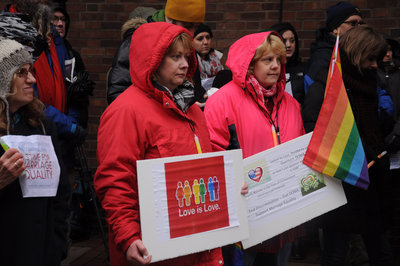Thousands both rallied for and protested against same-sex marriage outside of the U. S. Supreme Court this week as the nation’s top court took on the highly anticipated and publicized Proposition 8 and Defense of Marriage Act cases. The Supreme Court heard oral arguments in Hollingsworth vs. Perry March 26 and Windsor vs. United States the following day, both of which could change the game for marriage equality in the U.S. Hollingsworth vs. Perry was filed by two same-sex couples who contend that Proposition 8, which overturned marriage equality in California, is unconstitutional. The court has a number of options in its ruling — including finding an intrinsic right for gays and lesbians to marry, overturning all state bans on marriage equality, limiting the ruling to California or dismissing it for a lack of standing. In a press conference after Tuesday’s hearing, Theodore Olson of Gibson, Dunn & Crutcher LLP, who represented the plaintiffs in the Prop. 8 case along with David Boies, said he was pleased with the court’s attention to the matter. “There was no attempt to defend the ban on gay and lesbian marriage, no indication of any harm,” he said. Plaintiff Kris Perry said she was ready for marriage equality to become a reality. “In this country as children, we learn that there is a founding principle that all men and women are created equally,” she said. “We want this founding principle.” Perry’s partner, Sandy Stier, called Prop. 8 “a discriminatory law that hurts people. It hurts gays and lesbians in California. It hurts the children we are raising.” During the arguments, both sides brought up a variety of questions, including procreation as the foundation of marriage, the historical evolution of same-sex couples and marriage equality’s impact on children. Justice Anthony Kennedy, who many pundits say could be the deciding vote in the case, raised the concern that the concept of same-sex marriage is a new one. “We have five years of information to weigh against 2,000 years of history or more,” he said, but went on to note that “there is an immediate legal injury or legal — what could be a legal — injury and that’s the voice of these children. There are some 40,000 children in California that live with same-sex parents, and they want their parents to have full recognition and full status. The voice of those children is important in this case, don’t you think?” Justice Alito also said caution should be shown towards the “newness” of same-sex marriage. “The one thing that the parties in this case seem to agree on is that marriage is very important. It’s thought to be a fundamental building block of society and its preservation is essential for the preservation of society. Traditional marriage has been around for thousands of years,” Alito said. “But you want us to step in and render a decision based on an assessment of the effects of this institution which is newer than cell phones or the Internet? I mean we, we are not, we do not have the ability to see the future.” The Windsor case heard the following day looks more specifically at the federal benefits denied to same-sex couples because of DOMA, which the court could either uphold or overturn. The American Civil Liberties Union filed Windsor vs. U.S. on behalf of 83-year-old Edie Windsor, who had to pay more than $360,000 in taxes after the death of her wife, Thea Spyer, whom she legally married in New York. The case challenges section three of DOMA, which prevents the federal government from recognizing same-sex marriage. In a teleconference held last week with attorneys for Windsor, James Esseks, director of the ACLU’s LGBT Project, noted that there are 1,138 different contexts where being married makes a difference in the eyes of the federal government, including in Social Security, health care and income taxes. Andrew J. Ehrlich, partner at Paul, Weiss, Rifkind, Wharton & Garrison, LLP, said Windsor’s life with her partner encapsulates why DOMA should be considered discriminatory. “When Thea died, although the state treated them as married, the federal government did not,” Ehrlich said. “Windsor wanted to have an opportunity to right that wrong so that other people would not have to face that indignity during a time of profound loss and sorrow.” The rulings in both cases are expected by late June. David S. Cohen, associate professor at the Earle Mack School of Law at Drexel University, said there is a clear choice in both matters. “Rule for equality and be on the right side of history or rule for bigotry and be remembered with the infamous courts that have approved slavery, segregation and Japanese internment,” he said. Cohen said the Prop. 8 ruling could affect Pennsylvania marriage law as well. “If the court strikes down California’s marriage law because it discriminates against gays and lesbians, then Pennsylvania’s will fall as well. Pennsylvania has not prohibited gay marriage in its constitution, like many other states have, but it does have a statute prohibiting gay marriage. Hopefully, the Supreme Court’s ruling will pave the way for Pennsylvania couples to marry.”
Newsletter Sign-up
